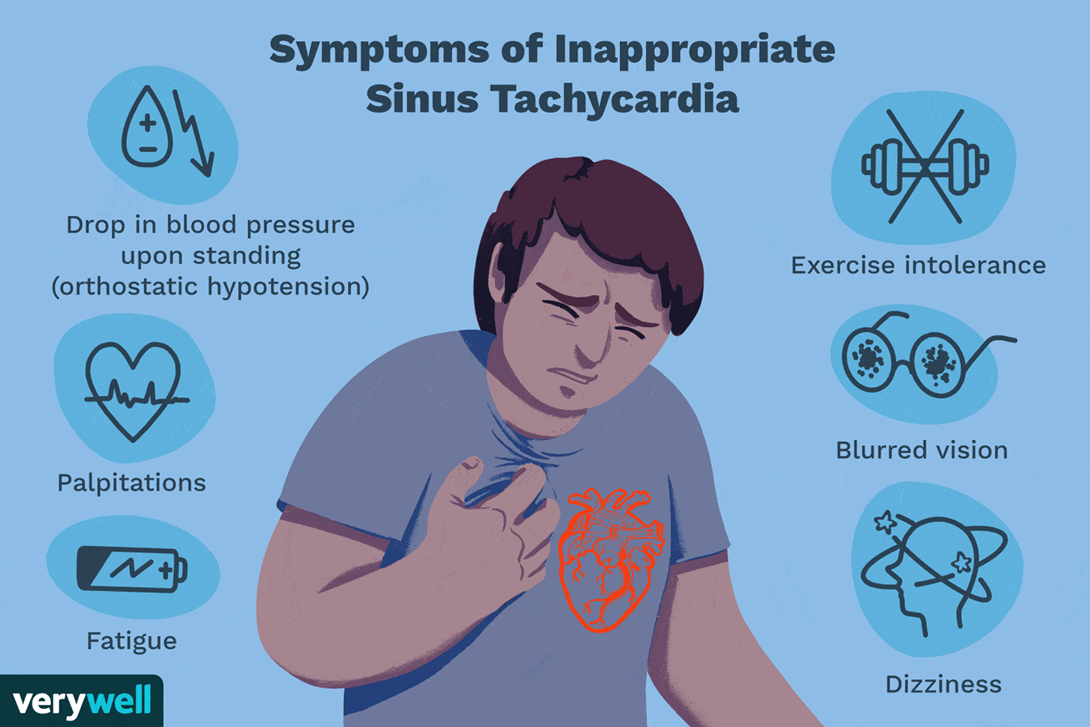A nurse is caring for a client who reports increased anxiety, nervousness, heat intolerance, and unintentional weight loss. Blood testing reveals decreased thyroid-stimulating hormone (TSH), elevated thyroxine (T4), and elevated triiodothyronine (T3). Which of the following vital sign abnormalities does the nurse anticipate?
Decreased body temperature
Tachycardia
Hypotension
Slow respiratory rate
The Correct Answer is B
Choice A reason: Decreased Body Temperature
Decreased body temperature is not typically associated with hyperthyroidism. In fact, hyperthyroidism often causes an increase in body temperature due to the accelerated metabolic rate. Patients with hyperthyroidism may experience heat intolerance and excessive sweating, but not a decrease in body temperature.
Choice B reason: Tachycardia
Tachycardia, or an abnormally fast heart rate, is a common symptom of hyperthyroidism. The elevated levels of thyroid hormones (T4 and T3) increase the body’s metabolism, leading to an increased heart rate. This can result in palpitations and a feeling of a racing heart, which are characteristic signs of hyperthyroidism. Therefore, tachycardia is the most likely vital sign abnormality in this scenario.
Choice C reason: Hypotension
Hypotension, or low blood pressure, is not typically associated with hyperthyroidism. Instead, hyperthyroidism can sometimes cause an increase in blood pressure due to the heightened metabolic activity and increased cardiac output4. Therefore, hypotension is not a characteristic finding in patients with elevated thyroid hormone levels.
Choice D reason: Slow Respiratory Rate
A slow respiratory rate is not commonly seen in hyperthyroidism. The condition usually leads to an increased respiratory rate due to the body’s heightened metabolic demands. Patients with hyperthyroidism may experience shortness of breath and rapid breathing, but not a slow respiratory rate.

Nursing Test Bank
Naxlex Comprehensive Predictor Exams
Related Questions
Correct Answer is C
Explanation
Choice A reason:
A client admitted for hip fracture surgery is at risk for various complications, but not specifically for hyperosmolar hyperglycemic syndrome (HHS). HHS is more commonly triggered by infections, severe dehydration, or other acute illnesses. While surgery can be a stressor, it is not as directly linked to HHS as infections are.
Choice B reason:
A client who is awaiting cataract surgery is not typically at high risk for developing HHS. Cataract surgery is generally a planned and controlled procedure that does not usually involve the acute stressors or infections that can precipitate HHS.
Choice C reason:
A client who is receiving an antibiotic for a urinary tract infection is at a higher risk for developing HHS. Infections are a common precipitating factor for HHS because they can cause significant stress on the body, leading to elevated blood glucose levels. The body’s response to infection can exacerbate hyperglycemia, especially in individuals with type 2 diabetes.
Choice D reason:
A client who is being evaluated for a breast lump is not typically at high risk for HHS. While the evaluation process can be stressful, it does not usually involve the acute physiological stressors or infections that are more directly linked to the development of HHS.
Correct Answer is A
Explanation
Choice A: Fasting blood glucose of 140 mg/dL
A fasting blood glucose level of 140 mg/dL is above the normal range (70-99 mg/dL) but may indicate some improvement in beta cell function if it was previously higher. In type 2 diabetes, beta cells in the pancreas are responsible for producing insulin. When beta cells start to restore their function, they can produce more insulin, which helps lower blood glucose levels. However, a fasting blood glucose level of 140 mg/dL still indicates that the client has diabetes and needs to continue managing their condition.
Choice B: Client reports smoking cessation
Smoking cessation is a positive health behavior and can improve overall health, including cardiovascular health, which is often compromised in individuals with diabetes. However, it does not directly indicate the restoration of beta cell function. Beta cell function is specifically related to the pancreas’s ability to produce insulin, and smoking cessation, while beneficial, does not directly impact this.
Choice C: Weight gain of 5 lb
Weight gain can have various implications for a person with type 2 diabetes. While modest weight gain might indicate improved nutritional status or muscle mass, it does not directly indicate the restoration of beta cell function. In fact, weight gain can sometimes worsen insulin resistance, making it harder for beta cells to function effectively.
Whether you are a student looking to ace your exams or a practicing nurse seeking to enhance your expertise , our nursing education contents will empower you with the confidence and competence to make a difference in the lives of patients and become a respected leader in the healthcare field.
Visit Naxlex, invest in your future and unlock endless possibilities with our unparalleled nursing education contents today
Report Wrong Answer on the Current Question
Do you disagree with the answer? If yes, what is your expected answer? Explain.
Kindly be descriptive with the issue you are facing.
